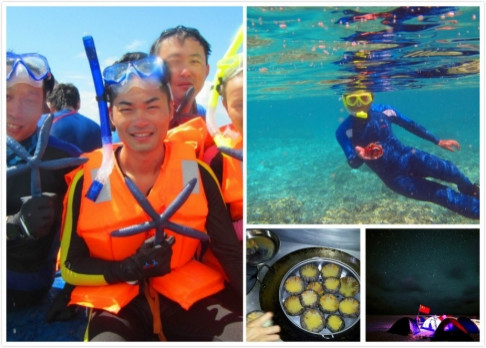Chinese Tourists Damaging Fauna and Flora On Disputed Paracel Islands Raise Ire Of Conservationists
Chinese tourists have become the center of media attention recently for their bad habits as travelers in foreign countries. An incident where a child wrote his name on the ancient Luxor Temple in Egypt even prompted China’s Vice Premier Wang Yang to make a statement about the tarnished reputation overseas caused by tourists. Most recently, conservationists were outraged after vacation photos of a Chinese couple spending a holiday at the disputed Paracel Islands made waves through China’s Internet.

These group of islands located in the South China Sea, which are claimed by both China and Vietnam, had recently become a tourist destination in April when a group of mainland Chinese tourists set sail for the islands for the first time. After a post online featuring pictures of tourists scuba diving, snorkeling and removing marine life out of their natural habitats, concern over the preservation of the previously barely-visited islands have begun to bubble up.
“Giant clams are best when served raw, they taste good with mustard and soy sauce,” the post said, accompanied with photos of the rare crustacean being prepared. “Most giant clams we picked weighed at least four kilograms [almost nine pounds],”
Those on tour groups headed for the Paracel Islands, advertised locally as “China’s Maldives,” boasts of hunting for sea creatures, fishing, diving and even catching and eating endangered species like the giant clam, which is protected by the Convention on International Trade in Endangered Species of Wild Fauna and Flora.

Other photos and captions showed the tour group eating freshly caught sea urchin. Criticism of the disruptive tourists flooded Chinese social media, with posts on the issue garnering thousands of ‘shares’ on China’s most popular social network, Weibo. “Don’t touch or damage any creatures living in their original environment—isn’t that very basic?” one blogger going by the last name Pan posted. “What will Xisha [the Paracel Islands] look like in two years if this is allowed?”
“Stop the so-called ‘tourism development’ before the Paracel Islands are destroyed,” many others wrote in agreement.
According to the South China Morning Post, 178 nations, including China, have all signed a multilateral pact that was drafted to protect the 34,000 species of rare animals and plants found on the Paracel Islands. Apparently, tour groups have completely ignored the regulations put forth by the agreement. “When I scuba dived in Sanya [a popular vacation destination in southern China] before, our coach would warn us not to disturb any sea creatures. How could they not know?” Pan said.
It’s unclear whether the online criticism will be enough to deter tourists from disturbing the natural habitat of the islands considering that travel to the disputed territory continues to be increasingly lucrative. Tour packages to the area can range from 5,000 to 8,500 yuan.
© Copyright IBTimes 2025. All rights reserved.






















